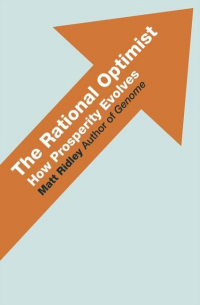The Ridley Riddle Part One: The Red Queen
Posted on 30 July 2011 by Andy Skuce
This is a three-part series on science writer, businessman and climate contrarian Matt Ridley. The first section looks at his science books and is critical of his latest book, The Rational Optimist; the second scrutinizes one of his blog posts on climate change and shows that his avowed lukewarmer stance is built on shaky scientific foundations; the final part examines Ridley’s history as a businessman, drawing parallels between his role in the credit crunch and his approach to climate change.
Sometimes, it’s easy to dismiss climate change contrarians as being a little slow when it comes to truly understanding science, but it’s not possible to do that with Matt Ridley, who has a well-earned reputation as a first-class science writer. He is on the Academic Advisory Council of the contrarian Global Warming Policy Foundation, along with Robert Carter, William Happer, Richard Lindzen, and Ian Plimer. As well as being the author of several excellent science books, he’s a journalist, a businessman, and has a D.Phil. in Zoology from Oxford. And he runs a blog that, among other things, takes a skeptical stance on the mainstream science of climate change.
Why such a talented science writer should have come to reject the scientific consensus on climate change is the Ridley Riddle that this series of posts will attempt to answer.
As background, here are nutshell summaries of two of his best-known early books:
- The Red Queen: an investigation of the evolutionary origins and advantages of sexual reproduction. The Red Queen Hypothesis (after the Queen in Alice in Wonderland who had to run faster and faster just to stay in the same spot) claims that one of the main benefits of having sex is to shuffle our genes with our partner’s, giving our offspring an advantage in gaining immunity against our asexual parasites.
- The Origin of Virtue: a study of the evolution of self-interest and cooperation in humans, devoting considerable attention to models of the social games that people play. We evolved organs and instincts to enable us to compete and cooperate with other humans. Our big brains may have evolved to keep track of our complex social networks, maintaining our own reputations while critically examining the character of others. We’re equipped with a computational organ that was most recently upgraded for running a natural version of Facebook, rather than complex calculations like climate models.
His other notable works include Genome: The Autobiography of a Species in 23 Chapters and Nature via Nurture: Genes, Experience, and What Makes Us Human. As a science writer, Ridley is in the same league, I would argue, as Stephen Jay Gould and Richard Dawkins. I had long hoped for a science popularizer of this caliber to turn his (or her) attention to climate. Perhaps I should have been more careful what I wished for…
The Rational Optimist: How Prosperity Evolves
Ridley’s latest book, The Rational Optimist, is not primarily about climate change; he devotes only half of one of the ten chapters to the subject. His main concern is in tracking and celebrating the progress that human civilization has made, especially in the past few thousand years, through the exchange of goods, services and ideas. For anyone who wants to get a summary of the book without actually buying a copy, I would suggest that you watch Ridley’s TED talk, When Ideas Have Sex.

Ridley argues that progress occurs when individuals can freely trade their goods, skills and ideas with their neighbors. This allows everyone to benefit from specializing at what they do best. Human societies prosper when individuals can live their lives free of what Ridley considers to be the parasitic and stifling influences of government and organized religion. According to him, constraints on development and progress are imposed by government, not by any natural limits to growth. George Monbiot has coined the word “cornutopian” to describe this world view: at once cornucopian and utopian.
By the low standards of the contrarian genre, the climate change section of The Rational Optimist is not that bad; Ridley refers to “the undoubted challenge of global warming by carbon dioxide”. There’s no outright denial of the basic science, even though he raises the familiar—and debunked—talking points of thriving polar bears, broken hockey sticks, and previous predictions in the 1970s of an imminent ice age. Most of Ridley’s discussion on climate seeks to downplay both the magnitude and likelihood of the negative consequences—he’s an avowed "lukewarmer"—while highlighting supposed benefits of climate change, such as longer growing seasons and CO2 fertilization. For anyone who has read any Bjørn Lomborg, this will be familiar territory.
There’s some gratuitous and revealing snark, as well, with sentences like: “Ocean acidification looks suspiciously like a back-up plan by the environmental groups in case the climate fails to warm: another try at condemning fossil fuels.” Elsewhere, he scoffs at the “rose-tinted nostalgia” of those who look to better times in the past. Like many contrarians, he can’t quite make up his mind about whether environmentalists are romantic fools or Machiavellian schemers.
The Red Queen and the Ultimatum Game: a counter-argument
Let’s extend the original Red Queen metaphor to depict our current predicament: in order to make upward material progress, we have to keep running ever faster up a down-escalator, driven by increasing population, depleting resources and the limitations of the climate system in accommodating the unprecedented assault we are inflicting on the chemistry of the atmosphere and oceans. Ridley is optimistic that human enterprise and ingenuity will be sufficient to sustain our upward progress, but just so long as "parasitic" governments don’t prevent us from conducting business as usual. To be sure, he may sometimes be correct in arguing that the physical limits to our use of physical resources are further away than some fear and that new technology, stimulated by market signals, will come to the rescue; certainly, there are several well-known historical cases where this has happened (eg, Malthus, Jevons, Ehrlich). However, our use—and abuse—of the oceans and atmospheres is certainly a valuable “good”; but since it’s not a tradable good, we shouldn’t suppose that trade will solve any problems that are brewing there.
A recurring theme in Ridley’s writing is that our evolution has equipped us with instincts to encourage and maintain reciprocity in the mutually beneficial exchanges we practice every day. Experiments with a game like the Prisoner’s Dilemma—in which cooperation over repeated games yields benefits for all, but betrayal provides bigger short-term benefits to the betrayer—provide insights into how we behave. However, I would argue, the Climate Change Game is one we will only get to play once and it is more similar to the Ultimatum Game, described by Wikipedia as:
… a game often played in economic experiments in which two players interact to decide how to divide a sum of money that is given to them. The first player proposes how to divide the sum between the two players, and the second player can either accept or reject this proposal. If the second player rejects, neither player receives anything. If the second player accepts, the money is split according to the proposal. The game is played only once so that reciprocation is not an issue.
……
In many cultures, people offer "fair" (i.e., 50:50) splits, and offers of less than 20% are often rejected.
The big difference, of course, is that in the case of climate change, the second player—future generations—won’t have the option to reject our offer, no matter how ungenerous it might be, and we don’t have to look them in the eye as we make it. Ridley would argue that the best offer we can make to the future is to maximize economic growth now and to leave our richer descendants to cope with the environmental consequences. Perhaps, but if we are to follow such a path, we had better look carefully and objectively at what the science is telling us about the kind of environmental legacy we are leaving.

The 1890-calorie Cheesecake Factory Grilled Shrimp & Bacon Club, considered the #1 Worst Sandwich in America.
Our evolution has equipped us with an appetite for sweet and fatty foods; it urges us: the more the better. This instinct was beneficial in a world of food scarcity but it doesn’t work so well today—just look at the waistlines of frequent diners at restaurants like the Cheesecake Factory. Our healthcare systems are now scrambling to find ways to mitigate our natural tendency to over-consume and to palliate the consequences.
Similarly, the instincts and institutions we have evolved for exchange and cooperation are valuable for allocating resources in the here-and-now, as well as for enabling specialization and stimulating technological progress. However, climate change is global in scope and has uncertain consequences that unfold over multi-generational timespans (Gardiner, 2006). Humans have never before encountered a problem with all of these characteristics and it would be fortuitous indeed if nature had already equipped us with the necessary instincts, culture, and institutions required to deal with such a challenge. Climate change is a novel problem that transcends the spatial, conceptual, and temporal boundaries that we have evolved to live within. To deal with it we surely need new ways of thinking about consumption and responsibility.
The second part of this series will look in detail at one of Matt Ridley’s blog articles on climate change and will show that his arguments there are based on a superficial reading of the mainstream literature. He relies on analysis done by contrarian blog scientists, something he would never do in his writings on evolution or genetics.































 Arguments
Arguments






























Back on topic, that Ridley has adopted both an extreme market libertarian position with regards to the role of government and a contrarian position with regards to climate change (or at least with regards to its consequences) strikes me as verging on crank magnetism. Again, all the more surprising given his apparent familiarity with collective action problems (of which prisoner's dilemmas are a principal component).
[DB] Note to all participants:
Please restrict the discussion on communism by tying your comments back to the OP with an establishment of relevance. Comments solely focusing on communism will be subject to moderation under the "No Politics" portion of the Comments Policy.
Please note that posting comments here at SkS is a privilege, not a right. This privilege can and will be rescinded if the posting individual continues to treat adherence to the Comments Policy as optional, rather than the mandatory condition of participating in this online forum.
Moderating this site is a tiresome chore, particularly when commentators intentionally submit offensive comments. We really appreciate people's cooperation in abiding by the Comments Policy, which is largely responsible for the quality of this site.
Finally, please understand that moderation policies are not open for discussion.
Please take the time to review the policy and ensure future comments are in full compliance with it. Thanks for your understanding and compliance in this matter.